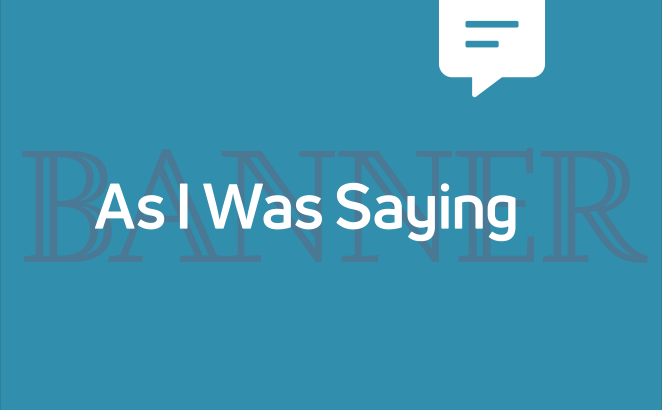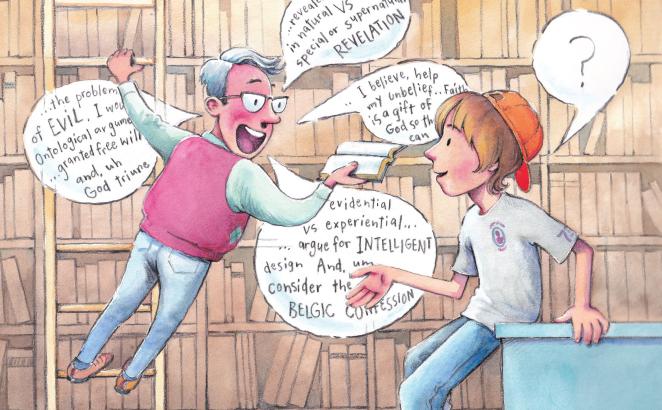See how readers responded to recent Banner issues, articles, and columns.
Columns
Read our regular columns on Faith Matters, Big Questions, Christian apologetics, Shiao Chong's monthly Editorial, the Discover page (especially for kids), the Vantage Point, the Other Six, and letters from Christian Reformed Church members and our readers. Our online-only columns are As I Was Saying and Behind the Banner.
- READ MORE
- READ MORE
The Bible says God hates “lying lips,” but there are also stories, such as Rahab helping the Israelite spies, where lying seems to be a good thing. So is lying sometimes okay?
- READ MORE
Conflicts, disappointments or boredom can begin to accumulate and you find yourself asking the question: When is it time to leave?
- READ MORE
The seeds from different grains are food that people and animals can eat.
- READ MORE
Recently I started a contracting company with two friends. We fixed the roof of a church and the exterior wall of a house. The church paid promptly. But an elder from the church who owns the house refused to pay the agreed amount.
- READ MORE
Those who know more tend to be more humble of their abilities because they are more aware of their own limitations.
- READ MORE
When broken people come to churches, they are looking for people who have walked in their shoes. They are seeking a community that becomes a safe place.
- READ MORE
As Protestant believers worked harder to distance themselves from Catholicism, I think they left behind some important ways of understanding God.
- READ MORE
Faith questions are and should be asked as teens start to make faith their own.
- READ MORE
Too many of TULIP’s terms are misleading and easily caricatured; they end up misrepresenting the Canons of Dort and giving a distorted impression of Reformed theology.
- READ MORE
Even for those who suffer chronically, God gives, uplifts, and strengthens. Moreover, he uses this suffering to advance the kingdom in mysterious ways.
- READ MORE
By now there’s a good chance you’ve heard of the horrific discovery at the home of the recently deceased abortion provider, Dr. Ulrich “George” Klopfer.
- READ MORE
Revision and reform are closely linked. We call ourselves the Reformed church as if it were past tense and complete. But we should be always reforming, allowing the Spirit to give us new vision and insight to re-vision what the Spirit says to us through Scripture.
- READ MORE
In prison he’d been tossed around like a rag doll, mistreated, abused. There’s no mercy for sex offenders in prison. He was terrified to return.
- READ MORE
The fallen leaves swirling along the avenue remind me that although it is warm enough to sit outdoors with my coffee on this October afternoon, winter is just around the corner. Looking up, I notice one leaf on an otherwise bare tree.
- READ MORE
엘리자베스는 다른 사람들은 모두 축복의 말들을 받았지만 자신은 제외되었음을 느꼈습니다. 다른 장애우들도 자신과 비슷한 경험이 있는지 궁금해졌습니다.
- READ MORE
The idea that Fox News-watching religious Republican voters are a stand-in for all evangelicals is ludicrous.
- READ MORE
My kid threw a fit when she saw the photos I had posted of her online. I think she’s overreacting, but what do you think?
- READ MORE
We do not choose our beliefs based simply on how good or useful they are. Truthfulness is as important a criterion as goodness.
- READ MORE
One of the quickest and easiest ways to fill a void in our lives is to buy something, and our mind convinces us for a moment that this will cure our ills.
- READ MORE
When we lack unity, or at the very least, mutual respect, as people of faith we lose our saltiness, and our light grows dim.
- READ MORE
Everything Christians do for the Lord has significance not only for this life, but for the life to come.
- READ MORE
See how readers responded to recent Banner issues, articles, and columns.
- READ MORE
I know what it’s like to be in a pastor’s family when called to a new church. This past year, I’ve gained new perspective going through a pastoral transition from the congregation’s side.













